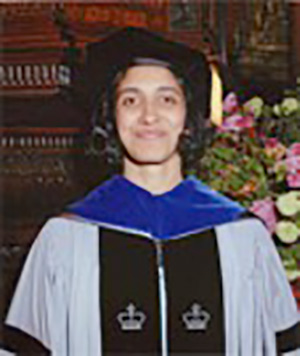TC Symposium on STEM and Citizenship Will Honor the Late Jhumki Basu
Faculty from across disciplines will address promoting civic participation through STEM; Jacqueline Faherty to keynote

At the symposium, “Cracking the Code: Teaching STEM for Citizenship in the 21st Century,” on Saturday, November 18, from 9 a.m. to 1:15 p.m. in TC’s Milbank Chapel, a multidisciplinary lineup of TC faculty members and guests will address the need for equitable education and opportunity in the STEM (science, technology, engineering and mathematics) disciplines. They will also explore an aspect of STEM education that doesn’t often get talked about: as a prerequisite for civic education and participation in the 21st century.
The symposium will feature keynote speaker Jacqueline Faherty, Senior Scientist & Senior Education Manager in the Department of Astrophysics at the American Museum of Natural History, who will talk about the struggles she overcame, as a woman of Puerto Rican heritage, in building her career as a high-level astrophysicist and researcher at a prestigious science institution. Click here to register to attend.
Aimed at working science educators in K-12 and higher education, as well as at TC students, the symposium also will address the need in a democracy to prepare students to become knowledgeable, active participants in civic life who understand and can challenge the political use of science – in particular, its role in economic growth, often at the expense of poor and marginalized communities.
The event, sponsored by the Jhumki Basu Foundation, honors a pioneering Teachers College alumna who thought a lot about these questions. Sreyashi Jhumki Basu (PhD. ‘06) dedicated her professional life to encouraging marginalized students to study the sciences, and she believed that was best accomplished by engaging them in real-life problems in their environment. “A diversity of youth,” she wrote, “should gain expertise in scientific knowledge and learn to think logically, investigate original questions and innovate in ways that fulfill needs in their lives, community and world.”
Jhumki Basu passed away in 2008, just two years after finishing her Ph.D. in science education. Her parents, Dipak Basu and Radha Ramaswami Basu, created the Jhumki Basu Foundation to bring their daughter’s vision to life. To mark Jhumki Basu’s 40th birthday, the Foundation is sponsoring the symposium at Teachers College to offer a new vision of STEM education grounded in civic engagement.
Faherty, for example, will recount her fight, from sixth grade in rural New York State through graduate school, to study advanced math and science to become the nationally prominent scientist she is today. Those experiences, Faherty says, made her a vigilant advocate for STEM education for all students, regardless of gender, race or ethnicity.
The symposium also will include:
- A panel, “Using STEM to Promote Youth Citizenship to Prepare for the Global Economy,” with TC faculty members Ellen Meier, Associate Professor of Practice and Director of the Center for Technology & Social Change; and Ioana Literat, Assistant Professor of Communication, Media, and Learning Technologies Design. It will also include Yvonne Thevenot, Executive Director of STEM Kids NYC; and be moderated by Felicia Moore Mensah, Associate Dean and Professor of Science Education; and Oren Pizmony-Levy, Assistant Professor of International and Comparative Education. Panelists will stress that, in an effort to promote STEM education for all students and to prepare them for careers in STEM disciplines, it is important for educators to understand the many ways in which they can encourage their students to engage in their civic duty to be advocates in STEM. The panel will provide teachers with practical tips to use in their STEM classrooms that promote both STEM advocacy and preparedness for all students.
- A spotlight session, “Inequality and Children’s Brain Development,” with Kimberly Noble, Associate Professor of Neuroscience and Education at TC, who will talk about her research on the effect of poverty on brain development.
- A panel, “Building Resilience by Learning From Failure in STEM Spaces,” featuring TC’s Xiaodong Lin, Associate Professor of Cognitive Studies; and Nathan Holbert, Assistant Professor of Communication, Media, and Learning Technologies Design; and moderated by Christopher Emdin, Associate Professor of Science Education. Many students view STEM disciplines as the most challenging in the curriculum. It is important for them to understand that failure is a part of learning, especially in STEM. The panel will discuss the skills students need to succeed in STEM courses, how teachers can support their students in the development of these skills, and how they can turn moments of failure into learning experiences for students.
- A performance by participants in Science Genius, an initiative founded by Emdin in select New York City high schools and middle schools that uses the power of hip-hop to engage urban youth in the study of science by meeting them on their cultural turf. The main activity involves students creating and performing their own science-themed raps based on topics that are aligned with state science standards and curricula and the Next Generation Science Standards.
Also attending the conference will be a group of Sci-Ed Innovators funded by the Jhumki Basu Foundation – New York City teachers whose work extends Jhumki Basu’s legacy.
Alumnus Edmund Adjapong, who received his Ph.D. in science education earlier this year and is now an Assistant Professor on the Education Studies Faculty at Seton Hall University, is leading the planning for the event. Adjapong, who is also the Science Genius Program Director at Seton Hall, said he is especially enthusiastic that the symposium will offer practical skills and tips to the teachers who will be attending.
“We want them to walk away knowing practical applications that they can use the next day in their classrooms, if they choose.”
Published Friday, Nov 10, 2017